英语必修三第一单元导学案
人教版高中英语必修3unit导学案

⼈教版⾼中英语必修3unit导学案Unit1Festivals around the world 导学案Warming-up课前⾃主练习Ⅰ.词汇过关1.________n.美⼈;美→________adj.→________adv.→________v.美化2.________vi.& vt.收获;收割→________n.3.________n.节⽇4.________n.秋天Ⅱ.短语⾃查1.另外三个________________2.take place________________3.中秋节________________语⾔要点Ⅰ.词语辨析 (旨在提供完形填空所需材料)1. take place / happen / occur / come about / break out【解释】take place表⽰“发⽣、举⾏、举办”,⼀般指⾮偶然性事件的“发⽣”,即这种事件的发⽣⼀定有某种原因或事先的安排。
happen作“发⽣、碰巧”解,⼀般⽤于偶然或突发性事件。
常⽤结构:碰巧做某事 happen to do碰巧发⽣某事It happens that某事发⽣在某⼈⾝上 sth happens to sboccur作“发⽣、想到、”解,其意义相当于happen,是正式⽤语.此外还可解释为突然想起常⽤结构:某⼈突然想起某事 It occurs to sb that=Sth occurs to sbcome about表⽰“发⽣、产⽣”,多指事情已经发⽣了,但还不知道为什么,常⽤于疑问句和否定句。
break out意思为“发⽣、爆发”,常指战争、灾难、疾病、⽕灾或者争吵等事件的发⽣,也可以表⽰突然⼤声叫喊等。
思考:所有的发⽣都有没有被动语态?【练习】根据句⼦的意思翻译或按要求填词。
1). Great changes have _________ (发⽣) in our hometown during the past ten years.2). _____________________ (我突然想起) I saw him on my way home yesterday.3). I _________ (碰巧) to see your sister crying on my way to school yesterday. I was in sucha hur ry that I had no time to ask what had happened ________ (介词) her?4). When the Second World War _________ (爆发), Tom was only a newborn infant.5). I’ ll never understand how it _________ (发⽣) that you were late three times a week.6). A big e arthquake _________ (发⽣) in th e south of China last year.单项填空( )(1) Suddenly it ______ to me that we should do what we could to collect money for the poor college students.A. happenedB. took placeC. occurredD. came about( )(2) It ______ that I was out when he came to see me.A. happenedB. took placeC. occurredD. came about2. celebrate / congratulate【解释】celebrate“庆祝”,后⾯跟某个节⽇或物。
英语必修三Unit 1 Festivals and Celebrations全单元导学案(共4部分)
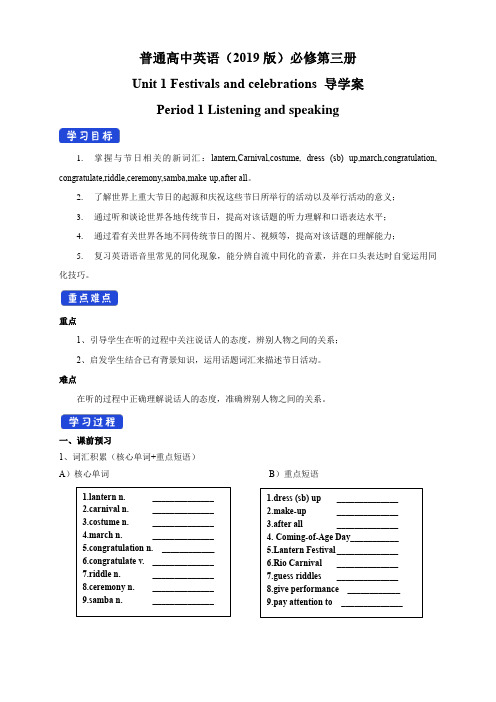
普通高中英语(2019版)必修第三册 Unit 1 Festivals and celebrations 导学案Period 1 Listening and speaking1. 掌握与节日相关的新词汇:lantern,Carnival,costume, dress (sb) up,march,congratulation, congratulate,riddle,ceremony,samba,make -up,after all 。
2. 了解世界上重大节日的起源和庆祝这些节日所举行的活动以及举行活动的意义;3. 通过听和谈论世界各地传统节日,提高对该话题的听力理解和口语表达水平;4. 通过看有关世界各地不同传统节日的图片、视频等,提高对该话题的理解能力;5. 复习英语语音里常见的同化现象,能分辨自流中同化的音素,并在口头表达时自觉运用同化技巧。
重点1、引导学生在听的过程中关注说话人的态度,辨别人物之间的关系;2、启发学生结合已有背景知识,运用话题词汇来描述节日活动。
难点在听的过程中正确理解说话人的态度,准确辨别人物之间的关系。
一、课前预习1、词汇积累(核心单词+重点短语) A )核心单词B )重点短语2.Brainstorming:There are many different festivals in our country.Which festivals do you like?二、Pronunciation1、The change in the pronunciation of the bold letters.①d uty e d ucation②u s e u s ually③new s new s paper④i s i ss ue ⑤las t year ⑥i n bed⑦tho s e shirts ⑧a s you see2、The change in the pronunciation of the consonants in the sentences.①Di d you enjoy the holiday?②Miss,congratulations o n becoming an adult!③It’ll be too tiring to walk or dance for a long time in tho s e shoes.④I was hoping to hear tha t you had a great time throughout.⑤Children then take part in Easter egg hunts to find the eggs and wi n prizes.⑥I n Mexico,the Day of the Dead is celebrated between October 31st and November 2nd.三、Language points1.dress (sb) up 穿上盛装;装扮【例句】Did you dress up for the occasion?是否曾为重大场合而精心打扮?【归纳拓展】dress up as...装扮成……;打扮成……dress oneself 自己穿衣be dressed in 穿着……(表示穿的状态)①She loved to dress _____ and she reveled in the attention bestowed up her from the other students.她喜欢精心打扮,陶醉于其他学生对她的注意。
高一英语必修3第1单元导学案
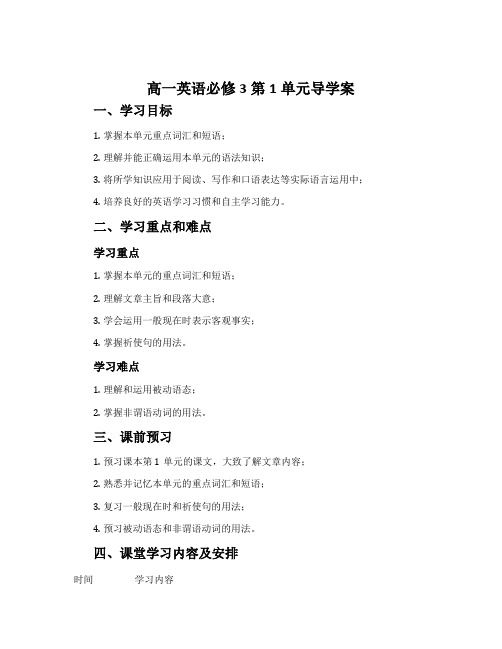
高一英语必修3第1单元导学案
一、学习目标
1.掌握本单元重点词汇和短语;
2.理解并能正确运用本单元的语法知识;
3.将所学知识应用于阅读、写作和口语表达等实际语言运用中;
4.培养良好的英语学习习惯和自主学习能力。
二、学习重点和难点
学习重点
1.掌握本单元的重点词汇和短语;
2.理解文章主旨和段落大意;
3.学会运用一般现在时表示客观事实;
4.掌握祈使句的用法。
学习难点
1.理解和运用被动语态;
2.掌握非谓语动词的用法。
三、课前预习
1.预习课本第1单元的课文,大致了解文章内容;
2.熟悉并记忆本单元的重点词汇和短语;
3.复习一般现在时和祈使句的用法;
4.预习被动语态和非谓语动词的用法。
四、课堂学习内容及安排
时间学习内容
10:00-10:20 复习本单元的重点词汇和短语
10:20-10:40 理解文章主旨和段落大意
10:40-11:00 运用一般现在时表示客观事实
11:00-11:20 掌握祈使句的用法
11:20-11:50 学习被动语态的用法
11:50-12:20 掌握非谓语动词的用法
五、课后练习和作业
1.完成课后练习题;
2.阅读课外读物,总结文中的重点词汇和短语,并写一篇读后感。
六、学习反思
1.总结本节课学到的重点知识;
2.将所学知识与实际运用结合,思考如何提高语言表达的准确性和流利度;
3.对自己的学习方法进行反思和调整,如何更有效地掌握英语知识。
人教版必修第三册Unit1Language Study素养导学案

Unit1 Language Study 素养导学案课前预学区I. 拓展单词1. _______ n. 祝贺;恭喜→_______ vt. 向(某人)道贺;(因某事)感到自豪2. _______ n. 起源;起因;出身→_______ adj. 原来的;起初的3. _______ n. 宗教;宗教信仰→_______ adj. 宗教的;笃信宗教的4. _______ n. 高兴;喜悦→_______ adj. 高兴的:快乐的5. _______ adj. 农业(劳动/生产)的→_______ n. 农业;农艺6. _______ vi. 聚集;集合vt. 聚集;搜集;收割→_______ n. 收集;采集;聚会7. _______ vt. 装饰:装潢→_______ n. 装潢;装饰品8. _______ adj. 商业(化)的;以获利为目的的→_______ vt. 使商业化→_______ n. 商业化9. _______ adj. 高兴的;满意的→_______ v. 喜欢;使满意;使愉快→_______ n. 快乐;高兴10. _______ n. 摔跤运动→_______ vi. &vt. 摔跤;奋力对付→_______ n. 摔跤运动员11. _______ adj. 简洁的;简单的;短暂的→_______ adv. 简要地;简短地Ⅱ. 短语快记1. dress (sb) _______ 穿上盛装;装扮2. _______ all毕竟;别忘了3. range from... _______… 包括从……到……之间4. fade _______ 逐渐消失;(身体)变得虚弱5. _______ spite of不管;尽管6. except _______ 除……之外7. take advantage of ______________8. have sth in common ______________9. to be frank ______________10. go off ______________11. set off ______________Ⅱ. 句式仿写1. However, no matter how different they may seem, all over the world, the spirit of sharing joy, gratitude, love, or peace is common in all festivals. (no matter how引导让步状语从句)______________, it plays a part in society and therefore deserves our respect. 无论一份工作多么平凡,它都在社会中发挥着作用,因此值得我们尊重。
人教版新课标必修三 Unit 1 单元导学案
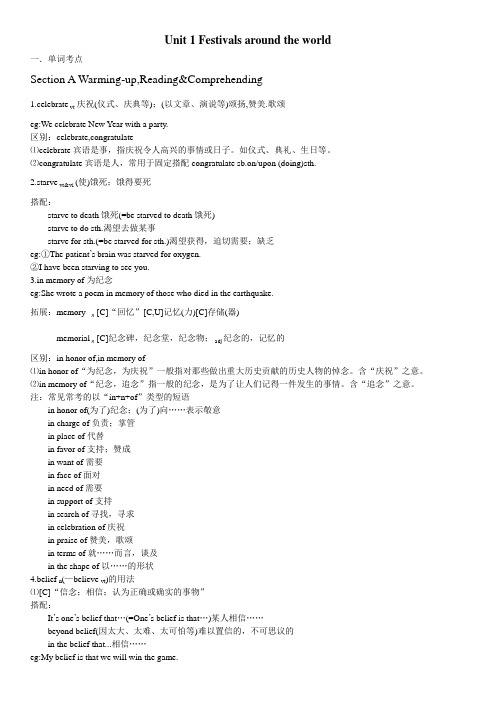
Unit 1 Festivals around the world 一.单词考点Section A Warming-up,Reading&Comprehending1.celebratevt庆祝(仪式、庆典等);(以文章、演说等)颂扬,赞美.歌颂eg:We celebrate New Year with a party.区别:celebrate,congratulate⑴celebrate宾语是事,指庆祝令人高兴的事情或日子。
如仪式、典礼、生日等。
⑵congratulate宾语是人,常用于固定搭配congratulate sb.on/upon (doing)sth.2.starvevi&vt(使)饿死;饿得要死搭配:starve to death饿死(=be starved to death饿死)starve to do sth.渴望去做某事starve for sth.(=be starved for sth.)渴望获得,迫切需要;缺乏eg:①The patient’s brain was starved for oxygen.②I have been starving to see you.3.in memory of为纪念eg:She wrote a poem in memory of those who died in the earthquake.拓展:memoryn[C]“回忆”[C,U]记忆(力)[C]存储(器)memorialn [C]纪念碑,纪念堂,纪念物;adj纪念的,记忆的区别:in honor of,in memory of⑴in honor of“为纪念,为庆祝”一般指对那些做出重大历史贡献的历史人物的悼念。
含“庆祝”之意。
⑵in memory of“纪念,追念”指一般的纪念,是为了让人们记得一件发生的事情。
含“追念”之意。
注:常见常考的以“in+n+of”类型的短语in honor of(为了)纪念;(为了)向……表示敬意in charge of负责;掌管in place of代替in favor of支持;赞成in want of需要in face of面对in need of需要in support of支持in search of寻找,寻求in celebration of庆祝in praise of赞美,歌颂in terms of就……而言,谈及in the shape of以……的形状4.belief n(—believe vt)的用法⑴[C]“信念;相信;认为正确或确实的事物”搭配:It’s one’s belief that…(=One’s belief is that…)某人相信……beyond belief(因太大、太难、太可怕等)难以置信的,不可思议的in the belief that...相信……eg:My belief is that we will win the game.⑵[C] ,教义,信条eg:Nothing will shake her belief in God.eg:If you are selling,you have to belief in the product.⑶[U]belief in sb./sth.对……的真实性和正确性所具有的信心;对……的或信赖搭配:have (no)belief in对……(无)信心have belief (that…)相信……(其中,that引导同位语从句)shake one’s belief in sth.动摇某人对某事的信心注:believe vt“信任;信心;”短语:believe sb.(=believe what sb.said=believe one’s words)相信某人(的话)believe in信任;信赖believe it or not信不信由你5.dress up盛装;打扮;装饰(注:其后既可跟人也可跟物作宾语。
必修3Unit 1 导学案
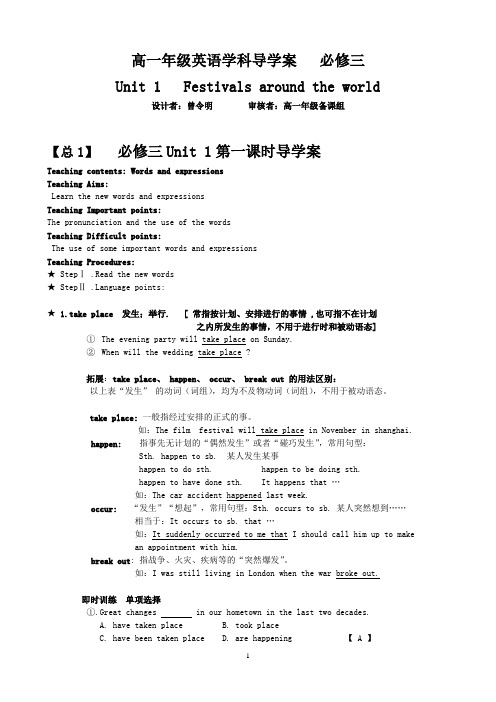
高一年级英语学科导学案必修三Unit 1 Festivals around the world设计者:曾令明审核者:高一年级备课组【总1】必修三Unit 1第一课时导学案Teaching contents: Words and expressionsTeaching Aims:Learn the new words and expressionsTeaching Important points:The pronunciation and the use of the wordsTeaching Difficult points:The use of some important words and expressionsTeaching Procedures:★ StepⅠ .Read the new words★ StepⅡ .Language points:★1.take place 发生;举行. [ 常指按计划、安排进行的事情 ,也可指不在计划之内所发生的事情,不用于进行时和被动语态]①The evening party will take place on Sunday.②When will the wedding take place ?拓展:take place、 happen、 occur、 break out 的用法区别:以上表“发生”的动词(词组),均为不及物动词(词组),不用于被动语态。
take place:一般指经过安排的正式的事。
如:The film festival will take place in November in shanghai.happen:指事先无计划的“偶然发生”或者“碰巧发生”,常用句型:Sth. happen to sb. 某人发生某事happen to do sth. happen to be doing sth.happen to have done sth. It happens that …如:The car accident happened last week.occur: “发生”“想起”,常用句型:Sth. occurs to sb. 某人突然想到……相当于:It occurs to sb. that …如:It suddenly occurred to me that I should call him up to make an appointment with him.break out: 指战争、火灾、疾病等的“突然爆发”。
必修三Unit1导学案
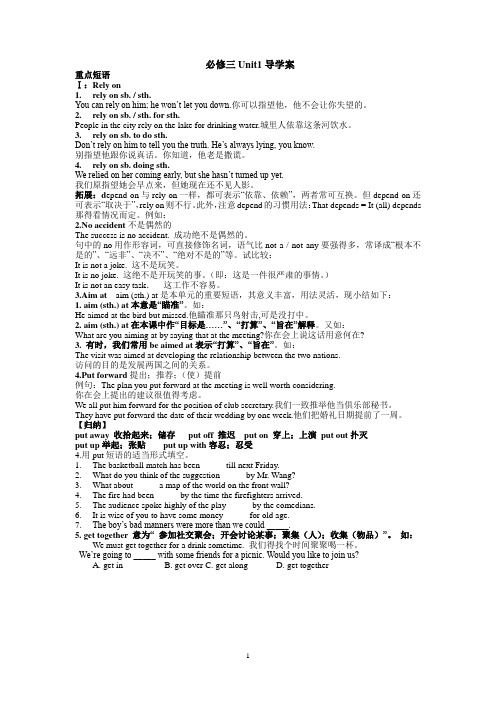
必修三Unit1导学案重点短语Ⅰ:Rely on1. rely on sb. / sth.You can rely on him; he won’t let you down.你可以指望他,他不会让你失望的。
2. rely on sb. / sth. for sth.People in the city rely on the lake for drinking water.城里人依靠这条河饮水。
3. rely on sb. to do sth.Don’t rely on him to tell you the truth. He’s always lying, you know.别指望他跟你说真话。
你知道,他老是撒谎。
4. rely on sb. doing sth.We relied on her coming early, but she hasn’t turned up yet.我们原指望她会早点来,但她现在还不见人影。
拓展:d epend on与rely on一样,都可表示“依靠、依赖”,两者常可互换。
但depend on还可表示“取决于”,rely on则不行。
此外,注意depend的习惯用法:That depends = It (all) depends 那得看情况而定。
例如:2.No accident不是偶然的The success is no accident. 成功绝不是偶然的。
句中的no用作形容词,可直接修饰名词,语气比not a / not any要强得多,常译成“根本不是的”、“远非”、“决不”、“绝对不是的”等。
试比较:It is not a joke. 这不是玩笑。
It is no joke. 这绝不是开玩笑的事。
(即:这是一件很严肃的事情。
)It is not an easy task.这工作不容易。
3.Aim at aim (sth.) at是本单元的重要短语,其意义丰富,用法灵活,现小结如下:1. aim (sth.) at本意是“瞄准”。
必修三unit1 001导学案
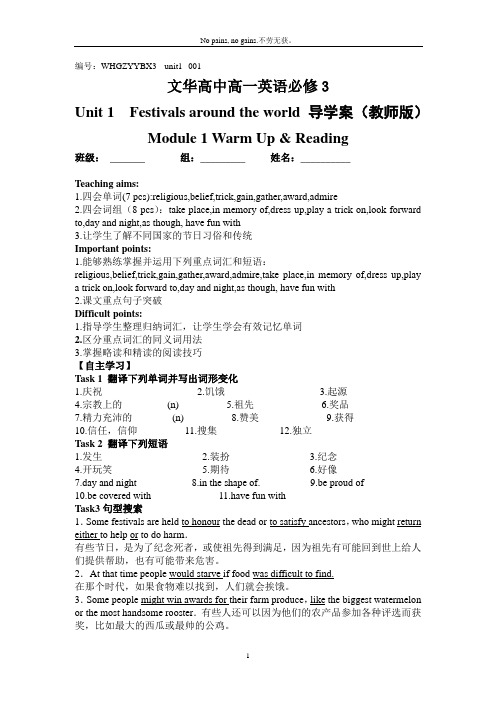
编号:WHGZYYBX3 --unit1--001文华高中高一英语必修3Unit 1 Festivals around the world导学案(教师版)Module 1 Warm Up & Reading班级:_______ 组:_________ 姓名:__________Teaching aims:1.四会单词(7 pcs):religious,belief,trick,gain,gather,award,admire2.四会词组(8 pcs):take place,in memory of,dress up,play a trick on,look forward to,day and night,as though, have fun with3.让学生了解不同国家的节日习俗和传统Important points:1.能够熟练掌握并运用下列重点词汇和短语:religious,belief,trick,gain,gather,award,admire,take place,in memory of,dress up,playa trick on,look forward to,day and night,as though, have fun with2.课文重点句子突破Difficult points:1.指导学生整理归纳词汇,让学生学会有效记忆单词2.区分重点词汇的同义词用法3.掌握略读和精读的阅读技巧【自主学习】Task 1翻译下列单词并写出词形变化1.庆祝_____________2.饥饿_____________3.起源_____________4.宗教上的_________(n)_________5.祖先_____________6.奖品_____________7.精力充沛的________(n)_________8.赞美_____________9.获得_____________ 10.信任,信仰_________ 11.搜集____________ 12.独立_____________Task 2 翻译下列短语1.发生_____________2.装扮_____________3.纪念____________4.开玩笑___________5.期待_____________6.好像_____________7.day and night___________8.in the shape of.__________9.be proud of___________ 10.be covered with_____________ 11.have fun with_____________Task3句型搜索1.Some festivals are held to honour the dead or to satisfy ancestors,who might return either to help or to do harm.有些节日,是为了纪念死者,或使祖先得到满足,因为祖先有可能回到世上给人们提供帮助,也有可能带来危害。
- 1、下载文档前请自行甄别文档内容的完整性,平台不提供额外的编辑、内容补充、找答案等附加服务。
- 2、"仅部分预览"的文档,不可在线预览部分如存在完整性等问题,可反馈申请退款(可完整预览的文档不适用该条件!)。
- 3、如文档侵犯您的权益,请联系客服反馈,我们会尽快为您处理(人工客服工作时间:9:00-18:30)。
姓名:班级:小组:小组评价:教师评价:Unit1 Festivals around the worldPart1 Words & Expressions上课时间:【学习目标】1.To get a brief understanding and remember the important words and expressions .2. To widen your vocabulary and master the usage of some key words and expressions.【重点难点】To memorize the usage of the words and expressions.一、独立预习:I单元重点词汇英汉互译并背诵1. ___________ vt. & vi. 收割2. ___________ vt. & vi. 饿死3. ___________ adj. 独立的;自主的4. ___________ adj. 农业的,农艺的5. ___________ vt. 赞美;钦佩6. ___________ vt. & vi. 淹没;溺死7. ___________ vt. 擦;擦去8. ___________ n. 基督徒9. ___________ n. 信任;信心 10. ___________ vi. 哭泣;流泪11. ___________ vt . 原谅;饶恕 12. ___________ adj. 宗教上的;虔诚的13. ___________ adj.充满活力的;精力充沛的 14. ___________adj. 显而易见的15. ____________ n. 庆祝;庆贺 16. ____________ n. 祖先;祖宗17. ____________ n. 习惯;风俗 18. ____________ n. 必要性;需要19. ____________ n. 预言;预报; 20. ____________ n. 广播员;报幕员II重点短语识记1. ________________ 发生,举行2. ______________ 节日和庆祝活动3. ________________ 为了纪念4. ______________ 以……形式5. ________________ 打扮6. _______________ 开玩笑,恶作剧7. _________________ 用……装饰…… 8. ________________ 聚集在一起9. _________________ 盼望,期待 10. _______________ 日日夜夜11. _________________ as though 12. ________________ have fun with13. _________________ be proud of 14. ______________ turn up15. _________________ keep one’s word16. ______________ hold one’s breath17. _________________ get married to 18. ______________ set off19. _________________ remind … of…20. ______________ throw away二、合作交流:写出下列单词的同源词并识记。
1. ___________ (n.) 美;美人___________(adj.)漂亮的_____________ (v.)美化2. ____________(n.) 庆祝_____________(v.)3. ____________ (n.)起源;由来__________ (adj.)原始的;最初的4. ____________(adj.)宗教的_________ (n.)宗教5. ____________(n.)信任;信仰_____________ (v.)相信6. (n.)到达____________ (v.)7. ______________(n.)独立(adj.)独立的;自主的8.______________ (n.)农业(adj.)农业的9. ____________(v.)赞美;钦佩(n.)(adj.)令人钦佩的10. ____________(v.)道歉_________ (n.)11. ____________ (adj.)___________ (n.)12. ____________(n.)诗人_________( n. )诗________(n.)诗三、探究展示:用所给词的适当形式完成下列句子。
1. Mexico gained its ______________ from Spain in l821. (depend)2. A local poor peasant ________ the soldiers through the forest. (leader)3. There is no doubt that the basic needs of the people should be ________ first. (satisfy)4. They John the first prize.(award)5. Most British schools organize ________ events for the students. (society)6. I tried aerobics (有氧运动) but it was too ________ for me. (energy)7. You should her for your rudeness.(apology)8. You were __________ enough to believe him. (fool)四、反馈总结:take place in memory of dress up look forward to day and night as though have fun with keep one‘s word1. Children often _______________________the arrival of a holiday.2. Mom, don‘t worr y about me. I am ______________________other boys.3. The Olympic Games __________________every four years.4. There is to be a get-together tonight. Please_____________________ for it.5. That school was founded ______________________the famous scientist.6. The couple worked ____________________to pay back their debt.7. It looks _________________ it‘s going to rain soon.8. I ________________________to visit him the next day.五、课后反思:姓名:班级:小组:小组评价:教师评价:Part2 Reading Festivals and celebrations 上课时间:【学习目标】1.To learn to talk about kinds of festivals2. To learn to read about the characteristic of different festivals around the world【重点难点】Improve the reading ability.一.知识链接:1. What kinds of festivals in China do you know about? Matching.The Double Ninth Festival 中秋节The Spring Festival 元宵节The Double Seventh Festival 清明节The Lantern Festival 春节Tomb Sweeping Day 重阳节The Dragon Boat Festival 七月七The Mid-autumn Day 端午节2. What Chinese public holidays do you know ? Matching.National Day 劳动节Children’s Day 元旦International Labour Day 国庆节New Year’s Day 妇女节The Youth Day 青年节International Women’s Day 儿童节3. What festivals of foreign countries do you know?名称英文名称月份情人节Valentine’s Day2月14日复活节Easter 3月21日或此日后月圆的第一个星期日耶稣受难日Good Friday 复活节前的星期五愚人节April Fool’s Day 4 月1日母亲节Mother’s Day5月的第二个星期日父亲节Father’s Day6月的第三个星期日劳动节Labor Day 5 月1日万圣节Halloween 10月31日感恩节Thanksgiving Day 11月的第四个星期4斋节Ramadan 穆斯林历的第9个月圣诞节Christmas Day 12月25日二.独立预习:Read the passage and try to find out the answer to the questions.How many types of festivals are mentioned in the passage? What are they?______________________________________________________________________ ______________________________________________________________________ 三.合作交流:1.What's right about the holiday Halloween?______A.It's a holiday for the dead.B.It's now a children's holiday.C.Children can dress up and ask for sweets.D.A, B and C.2. Which is the most energetic and important holiday?_____A.Obon. B.Columbus Day.C.The Spring Festival. D.The Mid-autumn Festival.3.Which of the following festivals can be happy events?____A.Thanksgiving Day. B.The Day of the Dead.C.Obon. D.None of the above.4.Which of the following festivals is not in spring?_____A.The Spring Festival in China. B.Easter.C.Cherry Blossom Festival. D.Christmas.5.Why do people love festivals according to the passage?______A.Because festivals let us enjoy life.B.Because festivals make us be proud of our customs.C.Because festivals can make us have fun with each other.D.All of the above.Kinds of Festivals Names of Festivals CountriesFestivals of the Dead Obon(1)____________________HalloweenJapanMexico(2)________________Festivals to Honour People The Dragon Boat FestivalColumbus DayThe Festival to honour GandhiChinaUSA(3)________________(4)______________ Thanksgiving DayThe Mid-autumn FestivalEuropean countriesChina and JapanSpring Festivals The Spring Festival Easter(5)____________________ChinaWestern countriesJapan五、反馈总结Retell the text by filling the following blanks:There are all kinds of festivals and __________ around the world, which are held for different reasons. The _______ _________ were mainly held at three times a year--- the end of the cold winter, planting in spring and harvest in autumn.Some festivals are held to _____ the dead or satisfy the _________ in case they might _______ either to help or to do harm , while other festivals are held to honor famous people or the gods, such as _________ _______ ______ and Columbus Day. Harvest and Thanksgiving festivals are happy events because the food is _________ for the winter and because a season of ___________work is over,to which Mid autumn festival belongs.And the most energetic and important festivals are the ones that look forward to the end of winter and to the ______ of spring, such as the ______ New Year, at which people have a very good time. 六、课后反思:阅读训练February has long been a month of romance. With the sweet smell of roses in the air, romantic(浪漫的)films hit cinemas and love stories fill newspapers and magazines.On the 14th day, it is a custom for a boy to take his girlfriend out to dinner, buy her flowers and chocolates, write poems, sing to her or even spell out her name with rose petals(花瓣)! This is what you see on Valentine’s Day, a day named after Valentine who was a priest (牧师)in the third century Rome. When the emperor (皇帝) decided that single (单身)men could become better soldiers than those with wives, he didn’t allow marriage.But Valentine continued to perform marriage ceremonies(仪式)for young lovers in secret. When his actions were discovered, the emperor sentenced him to death(判处死刑). While in prison, it is said that Valentine fell in love with the daughter of his prison guard. Before his death, he wrote her a letter, which he signed “From your Valentine”, an expression that is still in use today. Valentine died for what he believed in and so he was made a Saint (圣徒), as well as becoming one of history’s most romantic characters.Nowadays, Valentine’s Day is also popular among Chinese young people. Some students are planning to make Valentine’s cards for parents, te achers and friends. Others want to hold parties at which they will exchange small gifts and eat heart-shaped cakes. The idea is to have fun and encourage people to share in the spirit of St. Valentine.1. Why did the emperor in Rome not allow marriage in his country?A. Because there were few women in his country at that time.B. Because he thought men without wives could be better soldiers.C. Because there wasn’t enough food for so many people.D. Because he wanted to control the birth rate.2. Valentine was put into prison because ______.A. he killed one of the soldiersB. he stole a lot of foodC. he didn’t obey the emperor’s orderD. he didn’t want to be a soldier3. The last paragraph mainly tells us ______.A. students in China send cards to their teachersB. it is a good idea to celebrate Valentine’s Day in ChinaC. it is interesting to celebrate Valentine’s Day in ChinaD. Valentine’s Day is also popular in China now4. The best title for this passage should be ______.A. Valentine’s DayB. A Brave PriestC. Valentine’s Day in ChinaD. A Romantic Man姓名:班级:小组:小组评价:教师评价:Part3 Language points上课时间:【学习目标】掌握reading部分的重点单词和短语【重点难点】Memorize the usage of the words and expressions.一、独立预习:参考优化探究P3-P6,P9-P11完成下列词汇的学习:1.take place2.celebrate3.in memory of4.dress up5.trick6.award7.apologize 8.forgive二、合作交流:单元重点词汇用法:1.award(1) n.常用短语:get an award for :因为... 而获奖(2) vt.常用短语:award sb.sth = award sth.to sb.They John the first prize.The judge a large sum of money as damages.比较辩析:award: 奖,奖励,奖金,授予,既可以作名词也可以作动词.多指因竞赛获胜,工作成绩显著而获得奖励,强调荣誉.prize: 资金,奖品,战利品,指竞赛获奖,竞争,抽奖或者工作学习中的优胜者获得的奖励,可以是钱也可以是物.reward:奖金,报酬,回报,即可以是名词也可以作动词,指对某人的工作,帮助或服务等的报答或报酬或酬金.in reward 作为回报.即学即练习:(1).他获得本年度优秀学生奖.He won the for the best student of the year .(2).我不要任何报酬,我是因为喜欢才做的.I don’t expect anything ____ ;I did it because I enjoyed it(3).一等奖属于约翰.The first belongs to John.2. admire vt 钦佩;赞赏;羡慕(=respect)◇I admire him for his diligence. 我钦佩他的勤奋精神。
